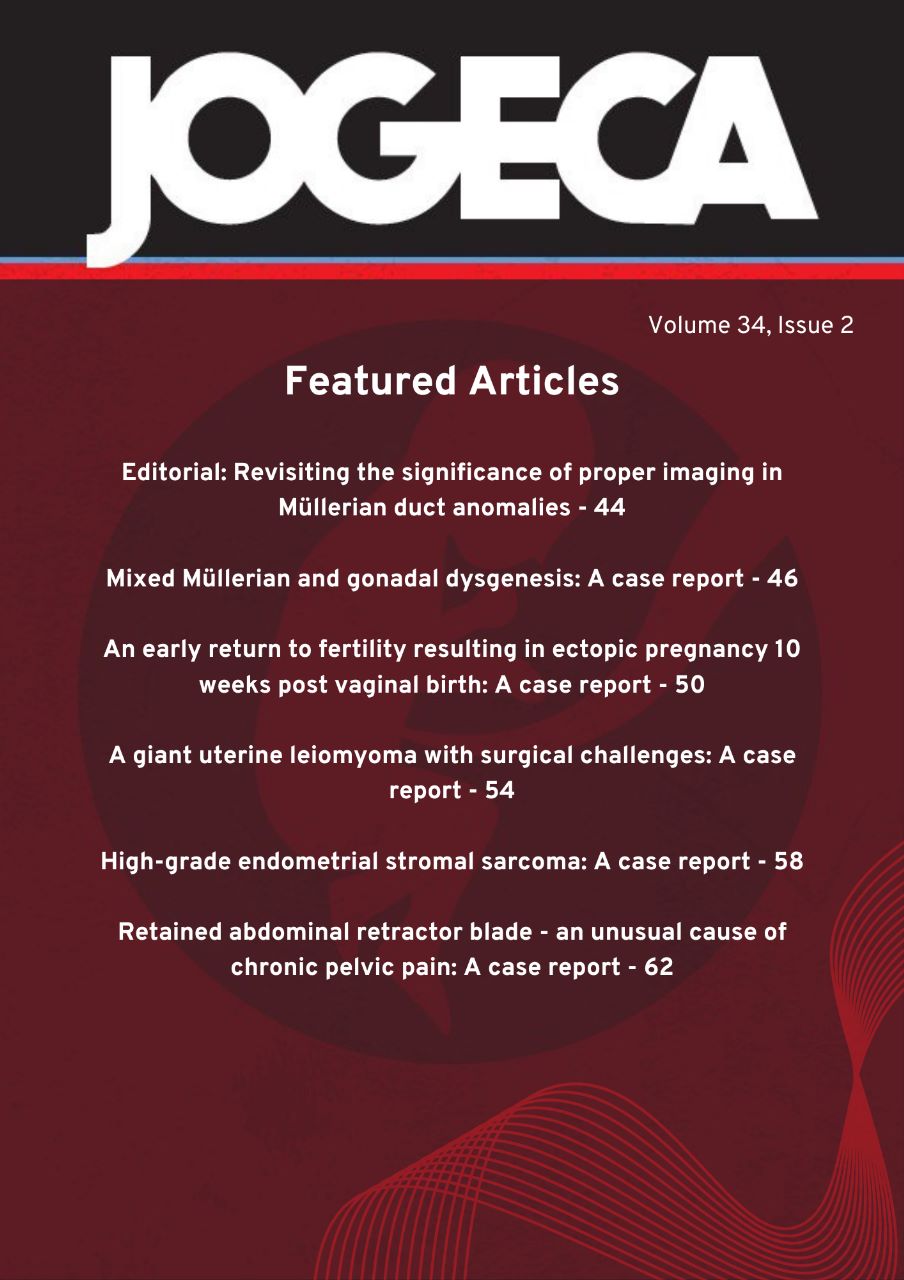Promoting delivery of reproductive health services through legal support and capacity development of healthcare providers in a health provider network in Kenya
DOI:
https://doi.org/10.59692/jogeca.v33i4.456Keywords:
reproductive health services, health provider networks, legal support, capacity building, KenyaAbstract
Background: Health provider networks (HPNs), an innovation in the private sector, is a service delivery model that has improved access to health services. However, there are no known studies or empirical evidence to support their effectiveness in Kenya.
Objective: To determine the influence that legal support and provider capacity building have on providing quality reproductive health services in a healthcare provider network in Kenya.
Methods: A cross-sectional study design was used. The study was carried out among Reproductive Health Network Kenya (RHNK) healthcare providers spread all over 42 counties in Kenya. The target population was 457 health care providers within RHNK. A sample of 252 health care providers was drawn using simple random sampling. A structured questionnaire was used to collect data from the 252 health care providers in the network. Quantitative data were analyzed using the IBM SPSS software, version 23, for descriptive and inferential statistics, and results were presented in tables.
Results: A total of 252 respondents were included in this study; 52 (n=132) were male. Forty-six percent % (n=117) of the respondents were between 41-50 years. Nurses were the majority at 73 (n=184), and 31 % % (n=78) of the respondents owned nursing homes. Fifty-one percent (n=127) of the respondents were diploma holders, and 28 (n=70) had 16-20 years of % work experience. The bivariate analysis reported that legal support (r=.235**, p< .05) and capacity building (r= .213**, p< .05) had a positive and significant influence on the provision of quality reproductive health services in the provider network.
Conclusion: Legal support and capacity building through training, mentorship, and coaching significantly impact reproductive health services quality in a provider network.
References
World Health Organization, editor. The World Health Report 2000: health systems: improving performance. Geneva: WHO; 2000. 215 p
World Health Organization. Everybody's business: strengthening health systems to improve health outcomes: WHO's framework for action. Geneva: WHO; 2007
Ministry of Health K. Kenya Health policy 2014 to 2030 [Internet]. Nairobi, Kenya: Ministry of Health; 2014 [cited 2021 Mar 17]. 87 p. Available from: http://publications.universalhealth2030.or g/ref/d6e32af10e5c515876d34f801774aa9 a
Provan K, Milward H. Health Services Delivery Networks: What Do We Know and Where Should We Be Headed? Healthc Pap. 2006 Nov 15;7(2):32 6
Tremblay D, Touati N, Roberge D, Breton M, Roch G, Denis J-L, et al. Understanding cancer networks better to implement them more effectively: a mixed methods multi-case study. Implement Sci [Internet]. 2015 Dec [cited 2021 Mar 17];11(1). Available from: http://www.implementationscience.com/content/11/1/39
Huerta T, Casebeer A, VanderPlaat M. Using Networks to Enhance Health Services Delivery: Perspectives, Paradoxes and Propositions. Healthc Pap. 2006 Nov 15;7(2):10–26
Hallo De Wolf A, Toebes B. Assessing Private Sector Involvement in Health Care and Universal Health Coverage in Light of the Right to Health. Health Hum Rights. 2016 Dec;18(2):79–92
Kenya Healthcare Federation [Internet]. 2018 [cited 2021 Aug 16]. Available from: https://khf.co.ke/
Popp JK, Milward HB, MacKean G, Casebeer A, Lindstrom R. Inter- Organizational Networks: A Review of the Literature to Inform Practice [Internet]. Washington, DC: IBM Center for The Business of Government; 2014 [cited 2021 Mar 17]. Available from: http://www.businessofgovernment.org/report/inter-organizational networks-review-literature-inform-practice
Radhakrishnan A, Clarke L, Greenberg L. How Collaborative Mentoring Networks Are Building Capacity in Primary Care. Healthc Q. 2019 Oct 31;22(3):54–60
Feyissa GT, Balabanova D, Woldie M. How Effective Are Mentoring Programs for Improving Health Worker Competence and Institutional Performance in Africa? A Systematic Review of Quantitative Evidence. J Multidiscip Healthc. 2019 Dec 5;12:989–1005
Downloads
Published
How to Cite
Issue
Section
Categories
License
Copyright (c) 2021 The Authors.

This work is licensed under a Creative Commons Attribution 4.0 International License.




